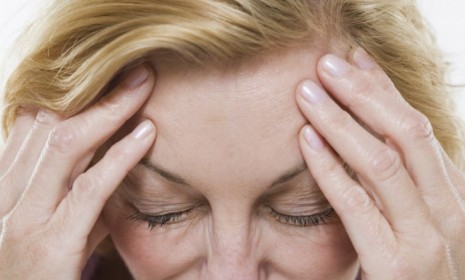Do women feel more pain than men?
After conducting a massive study, researchers argue that women are more likely than men to say "ouch"

A free daily email with the biggest news stories of the day – and the best features from TheWeek.com
You are now subscribed
Your newsletter sign-up was successful
According to a new study published in the appropriately titled Journal of Pain, women, on average, experience higher levels of pain than their male counterparts — and by a large margin. What's the evidence? Here, a guide:
How was this study conducted?
Researchers analyzed the electronic medical records of 11,000 men and women who were patients at the Stanford Hospital and Clinics. They specifically looked at how each person rated their pain on a 0 ("no pain") to 11 ("worst pain imaginable") scale — sifting through a total of more than 161,000 pain scores. The study included patients suffering from 47 different disorders and 250 different diagnoses, ranging from cancer to back conditions to infectious diseases.
The Week
Escape your echo chamber. Get the facts behind the news, plus analysis from multiple perspectives.

Sign up for The Week's Free Newsletters
From our morning news briefing to a weekly Good News Newsletter, get the best of The Week delivered directly to your inbox.
From our morning news briefing to a weekly Good News Newsletter, get the best of The Week delivered directly to your inbox.
And women felt more pain?
Yes. Women's pain scores in nearly each one of the diseases were, on average, 20 percent higher than men's scores, says Rachael Rettner at Mother Nature Network. The most surprising finding, says Dr. Atul Butte, the study's lead author, is that this was the case across nearly every disorder. Pain was particularly more potent for women in the lower back, knee, neck muscles, and sinuses.
Why?
Hormones may account for the gender gap, says Alice Park at TIME. Estrogen in women can dampen the activity of pain receptors, which, on its face, would allow women to actually tolerate higher levels of pain. However, that also means "they may become more sensitive to pain during low-estrogen parts of the menstrual cycle."
A free daily email with the biggest news stories of the day – and the best features from TheWeek.com
Any other explanations?
The observed difference might not be biological at all. Men may be compelled by cultural stereotypes to appear tough about pain, and therefore report feeling less of it than they actually do — "especially when asked by the mostly female nursing staff," Park says. In the end, says University of Florida pain researcher Roger B. Fillingim, more research is needed to pinpoint the exact reason for these differences in pain perception.
Sources: ABC News, Journal of Pain, Mother Nature Network, San Jose Mercury News, TIME
-
 Why is the Trump administration talking about ‘Western civilization’?
Why is the Trump administration talking about ‘Western civilization’?Talking Points Rubio says Europe, US bonded by religion and ancestry
-
 Quentin Deranque: a student’s death energizes the French far right
Quentin Deranque: a student’s death energizes the French far rightIN THE SPOTLIGHT Reactions to the violent killing of an ultraconservative activist offer a glimpse at the culture wars roiling France ahead of next year’s elections
-
 Secured vs. unsecured loans: how do they differ and which is better?
Secured vs. unsecured loans: how do they differ and which is better?the explainer They are distinguished by the level of risk and the inclusion of collateral